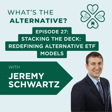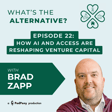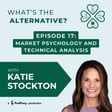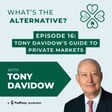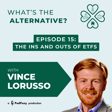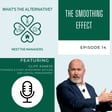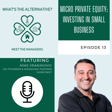
What's the Alternative? | Episode 11 | Crypto 101 featuring Matt Hougan
Welcome to Banrion Capital Management’s What’s the Alternative Podcast! Join host Shana Orczyk Sissel, the “Queen of Alternatives” Founder & CEO of Banrion Capital Management, as she interviews leaders in the alternative investment space. Learn more about their firms, their passions and about the many different ways investors can use alternative investments to add value in their investment portfolios.
In this episode Shana sits down with Matt Hougan, Chief Investment Officer at Bitwise Asset Management, a leading provider of crypto solutions for financial advisors.
Matt Hougan is one of the world’s leading experts on crypto, ETFs, and financial technology. He is the Chief Investment Officer for Bitwise Asset Management, the world’s largest provider of cryptocurrency index funds. He was previously CEO of ETF.com and Inside ETFs, where he helped build the world’s first ETF data and analytics system, the leading ETF media site, and the world’s largest ETF conference. Matt is co-author of two publications for the CFA Institute Research Foundation: “A Comprehensive Guide to Exchange-Traded Funds” and “Cryptoassets: The Guide to Bitcoin, Blockchain and Cryptocurrencies for Professional Investors.” He is a crypto columnist for Forbes, a three-time member of the Barron’s ETF Roundtable, a member of the ETFdb’s ETF Hall of Fame, and the eighth person to receive a Lifetime Achievement Award from ETF.com for contributions to the ETF industry. Hougan sits on the board of directors for Equbot, creator of the first AI-driven ETFs (in partnership with IBM Watson), and is a strategic advisor to multiple crypto- and financial advisor-related startups, including Blockworks, Stratifi, and Advisor Circle.
Learn More About Bitwise Asset Management: Bitwise Asset Management
Connect with Bitwise on 𝕏: @BitwiseInvest
Connect with Matt on 𝕏: @Matt_Hougan
Connect with Matt on LinkedIn: Matt Hougan
Matt's Presentation to the CFA Society of Minnesota: A Guide to Bitcoin, Blockchain & Crypto for the Professional Investor
Matt's CFA Whitepaper: Cryptoassets: The Guide to Bitcoin, Blockchain and Cryptocurrency for Investment Professionals
Learn More About Banrion: Banrion Capital Management
Connect with Banrion on 𝕏: @Banrion_Capital
Connect with Shana on LinkedIn: Shana Orczyk Sissel
Connect with Shana on 𝕏: @shanas621
If you are an advisor wanting to check out our platform, we want to hear your feedback!
Important Disclosures:
The opinions expressed on the “What’s the Alternative Podcast” are for general informational purposes only and are not intended to provide specific advice or recommendations for any individual or on any specific security.
It is only intended to provide education about the financial industry. To determine which investments may be appropriate for you, consult your financial advisor prior to investing. Any past performance discussed during this program is no guarantee of future



